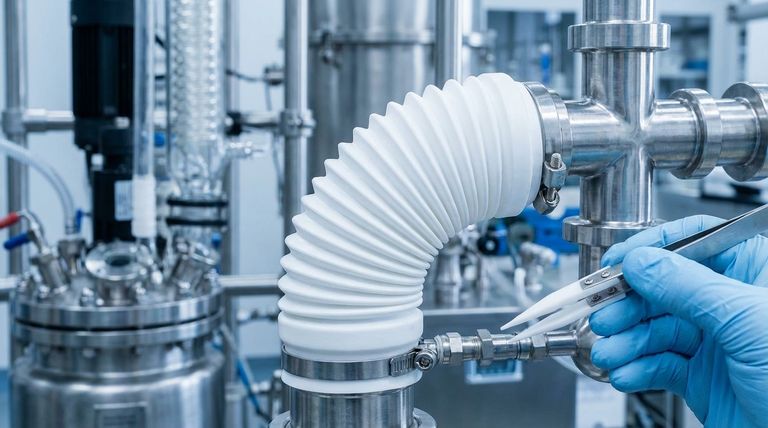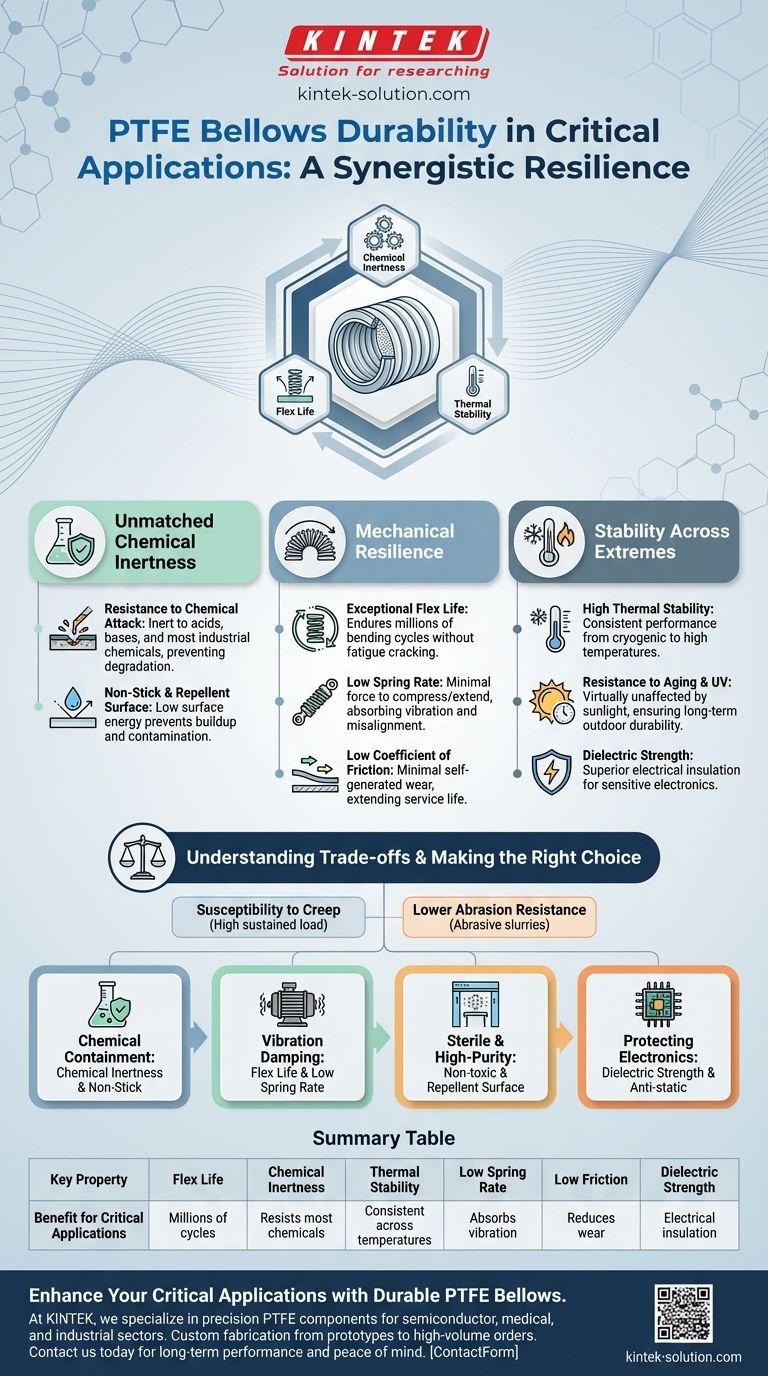The durability of PTFE bellows for critical applications stems from a unique combination of its extreme chemical inertness, high thermal stability, and remarkable flex life. These core properties ensure that the bellows maintain their structural integrity and performance even when subjected to corrosive chemicals, constant movement, and wide temperature variations, preventing failures in systems where reliability is paramount.
The core reason PTFE is trusted for demanding roles is not a single superpower, but its synergistic resilience. Its inability to react with chemicals, combined with its ability to bend millions of times without fatigue, creates a uniquely durable barrier for dynamic and hazardous environments.

The Foundation: Unmatched Chemical Inertness
The primary reason PTFE is specified for handling dangerous or high-purity substances is its near-total chemical resistance. This property is the bedrock of its durability in corrosive environments.
Resistance to Chemical Attack
PTFE is inert to nearly all industrial chemicals, acids, and bases. This prevents the material itself from degrading, swelling, or weakening over time, ensuring the bellows won't fail due to chemical corrosion.
Non-Stick and Repellent Surface
Its famously non-stick surface, a result of its low surface energy, prevents viscous materials from clinging and contaminants from building up. This ensures consistent flow and protects sterile environments from being compromised, contributing to long-term operational reliability.
Mechanical Resilience for Dynamic Systems
A bellows is, by definition, a component designed to move. PTFE's mechanical properties are ideally suited for this constant flexing, expansion, and compression.
Exceptional Flex Life
Flex life refers to a material's ability to endure repeated bending cycles without developing cracks or failing. PTFE has an exceptionally long flex life, allowing it to function reliably for millions of cycles in applications involving vibration, mechanical movement, or thermal expansion.
Low Spring Rate
PTFE bellows exhibit a low spring rate, meaning they require very little force to compress or extend. This makes them excellent for absorbing vibration and accommodating pipe misalignment without transmitting damaging stress to sensitive equipment or other parts of the system.
Low Coefficient of Friction
The material's inherently low friction means that as the bellows' convolutions move, there is minimal self-generated wear. This reduces material fatigue and particle generation, extending the component's service life.
Stability Across Extreme Environments
Beyond chemical and mechanical stress, PTFE maintains its integrity across a wide range of environmental conditions, making it a predictable and reliable choice.
High Thermal Stability
PTFE can operate consistently across a very broad temperature range. It does not become brittle at cryogenic temperatures or degrade at the high temperatures common in many industrial processes, ensuring predictable performance year-round.
Resistance to Aging and UV Degradation
Unlike many other polymers, PTFE is virtually unaffected by UV radiation from sunlight or the effects of aging. A PTFE bellows installed outdoors or left in service for years will not become brittle or lose its key properties.
Dielectric Strength for Electrical Shielding
For applications protecting sensitive electronics, PTFE serves as a superior electrical insulator. Its high dielectric strength prevents electrical arcing, and the availability of anti-static grades helps dissipate static charge safely in explosive or sensitive environments.
Understanding the Trade-offs
No material is perfect. While its strengths are significant, an objective assessment requires acknowledging its limitations.
Susceptibility to Creep
Under a constant, sustained load (especially at elevated temperatures), PTFE can be susceptible to creep, which is a slow, permanent deformation. This must be considered in designs involving high static pressures.
Lower Abrasion Resistance
PTFE is a relatively soft material. In environments with abrasive slurries or sharp particulates, it can be more prone to wear than harder plastics or metals. Pre-filtering or system design may be required to mitigate this.
Fabrication and Bonding
PTFE is notoriously difficult to bond to other materials. While techniques exist, they add complexity and cost to the manufacturing process compared to more common polymers.
Making the Right Choice for Your Goal
To apply this knowledge, match PTFE's primary strengths to the main challenge you are trying to solve.
- If your primary focus is chemical containment: Its near-total chemical inertness and non-stick surface make it the definitive choice for preventing leaks and contamination.
- If your primary focus is vibration damping or misalignment: Its high flex life and low spring rate allow it to absorb movement without transmitting stress to connected equipment.
- If your primary focus is a sterile or high-purity application: Its non-toxic, FDA-approved grades and repellent surface ensure the integrity of the process medium.
- If your primary focus is protecting sensitive electronics: Its high dielectric strength and available anti-static grades provide robust electrical isolation and safety.
By understanding this combination of chemical, mechanical, and environmental properties, you can confidently specify PTFE bellows for applications where failure is not an option.
Summary Table:
| Key Property | Benefit for Critical Applications |
|---|---|
| Exceptional Flex Life | Withstands millions of bending cycles without cracking or failure |
| Chemical Inertness | Resists virtually all industrial chemicals, acids, and bases |
| High Thermal Stability | Performs consistently from cryogenic to high temperatures |
| Low Spring Rate | Absorbs vibration and accommodates misalignment with minimal force |
| Low Coefficient of Friction | Reduces self-generated wear and extends service life |
| Dielectric Strength | Provides superior electrical insulation for sensitive electronics |
Ready to enhance your critical applications with durable PTFE bellows?
At KINTEK, we specialize in manufacturing precision PTFE components—including seals, liners, labware, and custom bellows—for semiconductor, medical, laboratory, and industrial sectors. Our expertise ensures your components are built to withstand corrosive chemicals, extreme temperatures, and constant movement, preventing failures where reliability is paramount.
We offer custom fabrication from prototypes to high-volume orders, tailored to your exact requirements. Let us help you achieve long-term performance and peace of mind.
Contact us today to discuss your project needs!
Visual Guide

Related Products
- Custom PTFE Parts Manufacturer for Teflon Parts and PTFE Tweezers
- Custom PTFE Parts Manufacturer for Teflon Containers and Components
- Custom PTFE Teflon Balls for Advanced Industrial Applications
- Custom PTFE Sleeves and Hollow Rods for Advanced Applications
- Custom PTFE Sealing Tapes for Industrial and High Tech Applications
People Also Ask
- Why is correct sizing more critical for PTFE O-Rings than for rubber O-Rings? Precision is Non-Negotiable
- What industries benefit from using pure PTFE in valve components and why? Ensure Absolute Purity in Critical Processes
- What are the key properties of PTFE that make it suitable for diaphragms? Unlock Superior Chemical & Thermal Resistance
- What are the key properties of PTFE that make it suitable for seals and gaskets? Unlock Superior Sealing Performance
- How do Teflon bushings benefit chemical processing plants? Enhance Reliability and Purity in Harsh Environments
- How is flow rate controlled in PTFE ball valves? Leverage Simple, Reliable Rotary Control
- What are the main benefits of PTFE lined butterfly valves? Superior Performance for Corrosive & High-Purity Media
- What environmental conditions were studied for PTFE sliding rubber bearing corrosion? Simulate Decades of Harsh Exposure



















